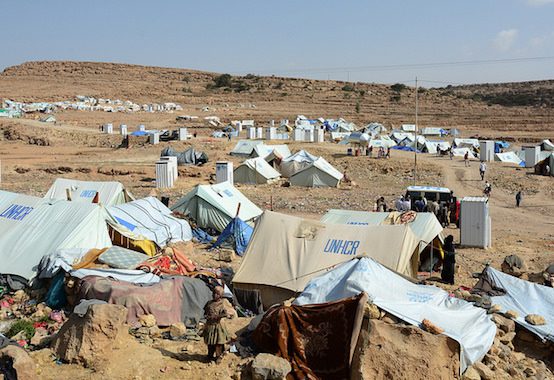The Humanitarian Crisis in Yemen Is Approaching a ‘Point of No Return’

Yemen’s humanitarian disaster is approaching a “point of no return”:
“The numbers affected are absolutely extraordinary,” said Mark Kaye, Save the Children’s Yemen spokesperson.
“We keep on talking about a country that’s on the brink of famine, but for me these numbers highlight that we’re at the point of no return. If things are not done now we are going to be looking back on this and millions of children will have starved to death, and we’ll all have been aware of this for some time. That will shame us as an international community for years to come [bold mine-DL].
“The problem is that you see the numbers but you don’t see the people behind it [bold mine-DL],” he said. “I’m always concerned when we’re waiting for a tick-box to happen before we say, ‘This is famine.’
The U.S. and Britain have helped bring Yemen to this awful state with their support for the Saudi-led coalition, and they could now make some reparations by reining in the coalition and insisting that they lift their sea and air blockades. Barbara Bodine, a former U.S. ambassador to Yemen, recently suggested an emergency airlift as a way to bring food into the country, but that would require Saudi agreement. Unfortunately, neither May’s government nor the Trump administration seems the least bit inclined to put pressure on the Saudis and their allies. Neither government has an incentive to draw attention to the disaster they have helped create. There are a few outspoken critics of this policy, but there aren’t many in Parliament or Congress calling them out for this.
Even if there were a surge in funding and aid right now, the aid still needs to get into the country, and at the moment the Saudi-led coalition is deliberately getting in the way of that as it has been for years. In order to distribute food in the country, there will also need to be a prolonged cease-fire, and that will never hold as long as the coalition’s supporters continue to provide arms and fuel to keep their campaign going. There needs to be a dramatic and swift change in U.S. and U.K. policies, but all signs point to the continuation of the disgraceful status quo.
Yemen’s famine could still be prevented, but it is almost too late. The international failure to respond effectively to Yemen’s crisis continues to be remarkable. One reason for that failure early on was lack of knowledge of the scale and severity of the crisis. There has been no consistent attention paid to the crisis in major media, and even when there is some coverage it often leaves out identifying the governments responsible for the disaster. The war on Yemen has been mostly neglected since it began, and even when there are reports on the humanitarian crisis they do not always identify the causes of the impending famine.
But those explanations can’t account for the near-total indifference to the plight of Yemen’s people almost two years later. The crisis had already been classified as one of the worst in the world in the summer of 2015, and yet here we are in 2017 and conditions have been allowed to deteriorate much further. That is happening in no small part because the governments that are in a position to avert disaster have been helping to bring it about and they don’t want to call attention to the horror they have unleashed on millions of innocent people.
Comments